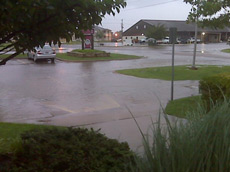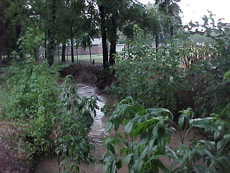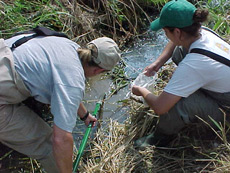Stormwater is water that starts to run along the ground rather than soaking into the ground. Stormwater can carry with it unwanted pollutants into the waterways of the state. The pollutants that stormwater can carry include sediment, oil, pesticides, nutrients (like fertilizer), litter and many others. These pollutants can have effects very near to the source of pollution (such as carrying mud and dirt onto a road or sidewalk creating an unsafe situation) and very far away (such as carrying fertilizers from crops planted in the Mississippi River drainage basin causing dead zones in the Gulf of Mexico near the mouth of the Mississippi River). Thus, it is important to take steps to minimize pollution to protect our natural resources including our drinking water. The ultimate purpose of stormwater management is for A-State to do its part in protecting the waterways of the state of Arkansas and the United States.
Arkansas State University is classified as a small Municipal Separate Storm Sewer System (MS4); a small MS4 is a municipality that has stormwater discharges from urban areas with a population of at least 50,000 people. Each MS4 must obtain a permit from the state to discharge stormwater to the waterways of the state. This permit, called a National Pollutant Discharge Elimination System (NPDES) permit, requires the covered MS4 to develop a Stormwater Management Plan (SWMP). This SWMP is the document that A-State uses to provide guidance to university employees, contractors and students and to enforce the stormwater regulations.
The Environmental Health and Safety (EHS) office has the primary responsibility for ensuring university compliance with the requirements of the Stormwater Management Plan (SWMP), however, staff, faculty, student and contractors all have an important role in helping ensure that stormwater is polluted as little as practicable.
- Report a spill or concern
- Arkansas Department of Environmental Quality - Office of Water Quality
- Clean Water Act of 1972 - EPA Website
- Stormwater Construction Permit
- University Stormwater Management Plan
WHAT IS STORMWATER RUNOFF?
Stormwater runoff occurs when precipitation from rain or snow melt flows over the ground. Impervious surfaces like driveways, sidewalks, and streets prevent stormwater from naturally soaking into the ground.
WHY IS STORMWATER RUNOFF A PROBLEM?
Stormwater can pickup debris, chemicals, dirt, and other pollutants and carry them into a storm sewer system, directly to a lake, stream, river, or wetland. Primary concerns for the campus community involve trash that makes its way to storm drains, then on to fresh water sources, and erosion due to construction, which carry or track mud onto roads and sidewalks.
The Effects of Pollution
Polluted stormwater runoff can have many adverse effects on plants, fish, animals, and people.
- Sediment can cloud water.
- Excess nutrients can cause algae blooms.
- Bacteria and other pathogens can wash into swimming areas.
- Debris - plastic bags, six-pack rings, bottles, and cigarette butts - washed into waterways can choke, suffocate, or disable wildlife.
How You Can Help
Everyone can help make a difference. Here are some things that you can do to make an impact.
- Inform EHS if you see a problem with waste, erosion or chemicals.
- Carry a litter bag in your car to collect waste.
- Dispose of litter in proper containers.
- Recycle motor oil. Maintain your car to prevent leaks.
- Wash your car at the car wash or on the lawn instead of the driveway.
- Do not use storm drains to dispose of liquid waste.
- During landscaping cover bare soil with mulch or hay and plant early.
- Do not clear cut vegetation on or near stream banks.
- Place rocks or shrubs on slopes to slow water and prevent erosion.









